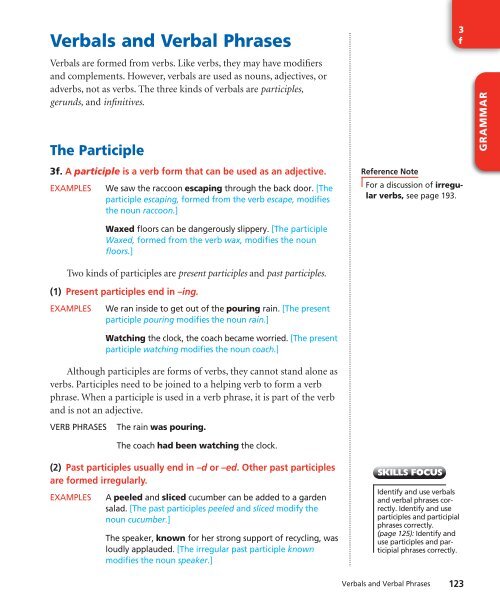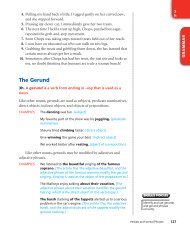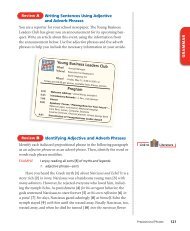Verbals and Verbal Phrases
Verbals and Verbal Phrases
Verbals and Verbal Phrases
You also want an ePaper? Increase the reach of your titles
YUMPU automatically turns print PDFs into web optimized ePapers that Google loves.
<strong><strong>Verbal</strong>s</strong> <strong>and</strong> <strong>Verbal</strong> <strong>Phrases</strong><br />
<strong><strong>Verbal</strong>s</strong> are formed from verbs. Like verbs, they may have modifiers<br />
<strong>and</strong> complements. However, verbals are used as nouns, adjectives, or<br />
adverbs, not as verbs. The three kinds of verbals are participles,<br />
gerunds, <strong>and</strong> infinitives.<br />
The Participle<br />
3f. A participle is a verb form that can be used as an adjective.<br />
EXAMPLES We saw the raccoon escaping through the back door. [The<br />
participle escaping, formed from the verb escape, modifies<br />
the noun raccoon.]<br />
Waxed floors can be dangerously slippery. [The participle<br />
Waxed, formed from the verb wax, modifies the noun<br />
floors.]<br />
Two kinds of participles are present participles <strong>and</strong> past participles.<br />
(1) Present participles end in –ing.<br />
EXAMPLES We ran inside to get out of the pouring rain. [The present<br />
participle pouring modifies the noun rain.]<br />
Watching the clock, the coach became worried. [The present<br />
participle watching modifies the noun coach.]<br />
Although participles are forms of verbs, they cannot st<strong>and</strong> alone as<br />
verbs. Participles need to be joined to a helping verb to form a verb<br />
phrase. When a participle is used in a verb phrase, it is part of the verb<br />
<strong>and</strong> is not an adjective.<br />
VERB PHRASES The rain was pouring.<br />
The coach had been watching the clock.<br />
(2) Past participles usually end in –d or –ed. Other past participles<br />
are formed irregularly.<br />
EXAMPLES A peeled <strong>and</strong> sliced cucumber can be added to a garden<br />
salad. [The past participles peeled <strong>and</strong> sliced modify the<br />
noun cucumber.]<br />
The speaker, known for her strong support of recycling, was<br />
loudly applauded. [The irregular past participle known<br />
modifies the noun speaker.]<br />
3<br />
f<br />
Reference Note<br />
For a discussion of irregular<br />
verbs, see page 193.<br />
Identify <strong>and</strong> use verbals<br />
<strong>and</strong> verbal phrases correctly.<br />
Identify <strong>and</strong> use<br />
participles <strong>and</strong> participial<br />
phrases correctly.<br />
(page 125): Identify <strong>and</strong><br />
use participles <strong>and</strong> participial<br />
phrases correctly.<br />
<strong><strong>Verbal</strong>s</strong> <strong>and</strong> <strong>Verbal</strong> <strong>Phrases</strong> 123<br />
GRAMMAR
GRAMMAR<br />
Reference Note<br />
For more about the<br />
passive voice, see<br />
page 209.<br />
HELP<br />
Some sentences<br />
in Exercise 4 contain<br />
more than one participle<br />
used as an adjective.<br />
124 Chapter 3 The Phrase<br />
Like a present participle, a past participle can also be part of a verb<br />
phrase. When a past participle is used in a verb phrase, it is part of the<br />
verb <strong>and</strong> is not an adjective.<br />
VERB PHRASES I have peeled <strong>and</strong> sliced the cucumber.<br />
The speaker was known for her strong support<br />
of recycling.<br />
NOTE<br />
Notice in the second example above that a past participle used<br />
with a form of the verb be creates a passive-voice verb. A verb in the<br />
passive voice expresses an action done to its subject.<br />
EXAMPLE The goal was made by Josh. [The action of the verb was<br />
made is done to the subject goal.]<br />
Exercise 4 Identifying Participles <strong>and</strong> the Words<br />
They Modify<br />
Identify the participles used as adjectives in each of the following sentences.<br />
After each participle, write the noun or pronoun it modifies.<br />
EXAMPLES 1. We searched the isl<strong>and</strong> for buried treasure.<br />
1. buried—treasure<br />
2. The speeding train raced past the platform.<br />
2. speeding—train<br />
1. The prancing horses were loudly applauded by the audience.<br />
2. Colorful flags,waving in the breeze, brightened the gloomy day.<br />
3. Swaggering <strong>and</strong> boasting, the new varsity quarterback made us<br />
extremely angry.<br />
4. The game scheduled for tonight was postponed because of rain.<br />
5. Leaving the field, the happy player rushed to her parents sitting in<br />
the bleachers.<br />
6. Branches tapping on the roof <strong>and</strong> leaves rustling in the wind made<br />
an eerie sound.<br />
7. We thought the banging shutter upstairs was someone walking in<br />
the attic.<br />
8. Painfully sunburned,Ivowed always to use sunscreen <strong>and</strong> never to<br />
be so careless again.<br />
9. Terrified by our dog, the burglar turned <strong>and</strong> fled across the yard.<br />
10. The platoon of soldiers, marching in step, crossed the field to the<br />
stirring music of the military b<strong>and</strong>.
Exercise 5<br />
Using Appropriate Participles<br />
For each blank in the following sentences, provide a participle that fits<br />
the meaning of the sentence.<br />
EXAMPLE 1. The tide washed over the beach.<br />
1. rising<br />
1. Mr. Ortiz explained the effects of pollution <strong>and</strong> drought on plants<br />
in a rain forest.<br />
2. from the point of view of a firefighter, the story is full of<br />
accurate details.<br />
3. The tiger, from the hunters, swam across the river to safety.<br />
4. at the traffic light, the driver put on his sunglasses.<br />
5. The tourists in the hotel were given a free meal.<br />
6. as an excellent place to camp, the park lived up to its<br />
reputation.<br />
7. by a bee, Steven hurried to the infirmary.<br />
8. The poem describes a spider on a thread.<br />
9. We stumbled off the racecourse, .<br />
10. , I quickly phoned the hospital.<br />
The Participial Phrase<br />
3g. A participial phrase is used as an adjective <strong>and</strong> consists of a<br />
participle <strong>and</strong> any complements or modifiers the participle has.<br />
EXAMPLES Seeing the cat, the dog barked loudly.<br />
The cat hissed at the dog barking in the yard next door.<br />
The dog noisily barking at the cat had to be brought in.<br />
In each of the following sentences, an arrow points from the participial<br />
phrase to the noun or pronoun that the phrase modifies.<br />
EXAMPLES Switching its tail, the mountain lion paced back <strong>and</strong> forth.<br />
[participle with object tail]<br />
She heard me sighing loudly. [participle with the adverb<br />
loudly]<br />
Living within his budget, Adam never needs to borrow<br />
money. [participle with adverb phrase within his budget]<br />
Quickly grabbing the keys, I dashed for the front door.<br />
[participle with preceding adverb Quickly <strong>and</strong> object keys]<br />
3<br />
g<br />
Reference Note<br />
For information on<br />
punctuating participial<br />
phrases, see page 327.<br />
The participle as a<br />
dangling modifier<br />
is discussed on page 259.<br />
For information on using<br />
participles to combine<br />
sentences, see page 490.<br />
A participial phrase should<br />
be placed very close to<br />
the word it modifies.<br />
Otherwise, the phrase may<br />
appear to modify another<br />
word, <strong>and</strong> the sentence<br />
may not make sense.<br />
MISPLACED<br />
He saw a moose riding his<br />
motorcycle through the<br />
woods. [The placement of<br />
the modifier riding his<br />
motorcycle calls up a silly<br />
picture. He, not the<br />
moose, is riding the<br />
motorcycle.]<br />
IMPROVED<br />
Riding his motorcycle<br />
through the woods, he<br />
saw a moose.<br />
<strong><strong>Verbal</strong>s</strong> <strong>and</strong> <strong>Verbal</strong> <strong>Phrases</strong> 125<br />
GRAMMAR
GRAMMAR<br />
HELP<br />
Some sentences<br />
in Review D contain more<br />
than one participle or<br />
participial phrase.<br />
126 Chapter 3 The Phrase<br />
Exercise 6<br />
Identifying Participial <strong>Phrases</strong><br />
Identify the participial phrases in the following sentences, <strong>and</strong> give the<br />
word each phrase modifies.<br />
EXAMPLE 1. The sight of skyscrapers towering against the sky always<br />
impresses me.<br />
1. towering against the sky—skyscrapers<br />
1. How are skyscrapers created, <strong>and</strong> what keeps them st<strong>and</strong>ing tall?<br />
2. As the drawing shows, columns of steel, or of concrete reinforced<br />
with steel, are sunk into bedrock beneath the building.<br />
3. If a layer of rock isn’t present, these columns are sunk into a thick<br />
concrete pad spread across the bottom of.a deep basement.<br />
4. From this foundation rises a steel skeleton,supporting the walls<br />
<strong>and</strong> floors.<br />
5. This cutaway drawing shows how this skeleton,covered with a<br />
“skin” of.glass <strong>and</strong> metal, becomes a safe working <strong>and</strong> living space<br />
for people.<br />
6. This method of building, first developed in the United States,is<br />
used now in many other places in the world.<br />
7. Chicago, nearly destroyed by fire in 1871, was later rebuilt with<br />
innovative designs.<br />
8. The first skyscraper constructed on a metal frame was built there<br />
during this period.<br />
9. Architects, using the latest materials, were glad to design in<br />
new ways.<br />
10. Chicago, known as the site of.the original 10-story skyscraper,<br />
now is home to the 110-story Sears Tower.<br />
Review D Identifying Participles <strong>and</strong> Participial<br />
<strong>Phrases</strong><br />
Identify the participial phrases <strong>and</strong> participles that are used as adjectives<br />
in the following sentences. Then, give the words they modify.<br />
EXAMPLE 1. Cats, known for their pride <strong>and</strong> independence, are<br />
supposedly hard to train.<br />
1. known for their pride <strong>and</strong> independence—Cats<br />
1. One day I was giving Chops, my spoiled cat, treats.<br />
2. St<strong>and</strong>ing on her hind legs, she reached up with her paw.<br />
3. Chops,grabbing for my fingers, tried to bring the tasty morsel closer.
4. Pulling my h<strong>and</strong> back a little,Itugged gently on her curved paw,<br />
<strong>and</strong> she stepped forward.<br />
5. Praising my clever cat,Iimmediately gave her two treats.<br />
6. The next time I held a treat up high, Chops, puzzled but eager,<br />
repeated the grab-<strong>and</strong>-step movement.<br />
7. Soon Chops was taking steps toward treats held out of.her reach.<br />
8. I now have an educated cat who can walk on two legs.<br />
9. Grabbing the treats <strong>and</strong> gobbling them down, she has learned that<br />
certain moves always get her a snack.<br />
10. Sometimes after Chops has had her treat, she just sits <strong>and</strong> looks at<br />
me, no doubt thinking that humans are truly a strange bunch!<br />
The Gerund<br />
3h. A gerund is a verb form ending in –ing that is used as a<br />
noun.<br />
Like other nouns, gerunds are used as subjects, predicate nominatives,<br />
direct objects, indirect objects, <strong>and</strong> objects of prepositions.<br />
EXAMPLES The dancing was fun. [subject]<br />
My favorite part of the show was his juggling. [predicate<br />
nominative]<br />
Shauna tried climbing faster. [direct object]<br />
Give winning the game your best. [indirect object]<br />
We worked better after resting. [object of a preposition]<br />
Like other nouns, gerunds may be modified by adjectives <strong>and</strong><br />
adjective phrases.<br />
EXAMPLES We listened to the beautiful singing of the famous<br />
soprano. [The article the, the adjective beautiful, <strong>and</strong> the<br />
adjective phrase of the famous soprano modify the gerund<br />
singing. Singing is used as the object of the preposition to.]<br />
The Mallorys enjoy talking about their vacation. [The<br />
adjective phrase about their vacation modifies the gerund<br />
talking, which is the direct object of the verb enjoy.]<br />
The harsh clacking of the tappets alerted us to a serious<br />
problem in the car’s engine. [The article The, the adjective<br />
harsh, <strong>and</strong> the adjective phrase of the tappets modify the<br />
gerund clacking.]<br />
Identify <strong>and</strong> use gerunds<br />
<strong>and</strong> gerund phrases<br />
correctly.<br />
3<br />
h<br />
<strong><strong>Verbal</strong>s</strong> <strong>and</strong> <strong>Verbal</strong> <strong>Phrases</strong> 127<br />
GRAMMAR





